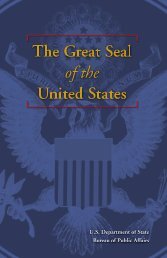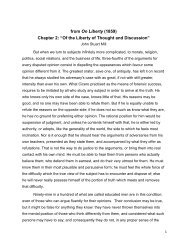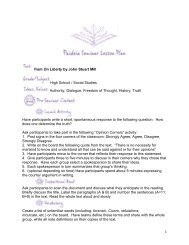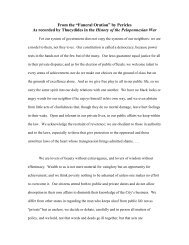Rousseau_contrat-social
You also want an ePaper? Increase the reach of your titles
YUMPU automatically turns print PDFs into web optimized ePapers that Google loves.
space of time which circumstances sometimes withhold. A thousand cases<br />
against which the legislator has made no provision may present<br />
themselves, and it is a highly necessary part of foresight to be<br />
conscious that everything cannot be foreseen.<br />
It is wrong therefore to wish to make political institutions so strong<br />
as to render it impossible to suspend their operation. Even Sparta<br />
allowed its laws to lapse.<br />
However, none but the greatest dangers can counterbalance that of<br />
changing the public order, and the sacred power of the laws should never<br />
be arrested save when the existence of the country is at stake. In these<br />
rare and obvious cases, provision is made for the public security by a<br />
particular act entrusting it to him who is most worthy. This commitment<br />
may be carried out in either of two ways, according to the nature of the<br />
danger.<br />
If increasing the activity of the government is a sufficient remedy,<br />
power is concentrated in the hands of one or two of its members: in this<br />
case the change is not in the authority of the laws, but only in the<br />
form of administering them. If, on the other hand, the peril is of such<br />
a kind that the paraphernalia of the laws are an obstacle to their<br />
preservation, the method is to nominate a supreme ruler, who shall<br />
silence all the laws and suspend for a moment the sovereign authority.<br />
In such a case, there is no doubt about the general will, and it is<br />
clear that the people’s first intention is that the State shall not<br />
perish. Thus the suspension of the legislative authority is in no sense<br />
its abolition; the magistrate who silences it cannot make it speak; he<br />
dominates it, but cannot represent it. He can do anything, except make<br />
laws.<br />
The first method was used by the Roman senate when, in a consecrated<br />
formula, it charged the consuls to provide for the safety of the<br />
Republic. The second was employed when one of the two consuls nominated<br />
a dictator:[38] a custom Rome borrowed from Alba.<br />
During the first period of the Republic, recourse was very often had to<br />
99











